|
33-34 Snargate Street
Dover
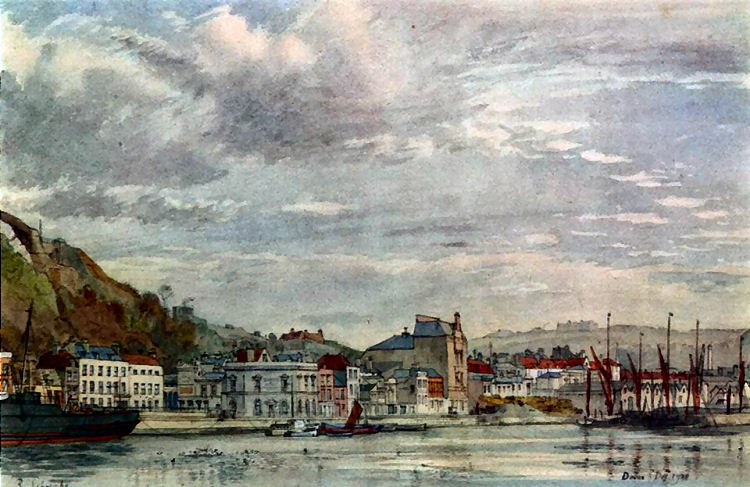
Above painting 1928 showing the Royal Hippodrome (centre)and Northampton
Street and the Wellington Docks. |
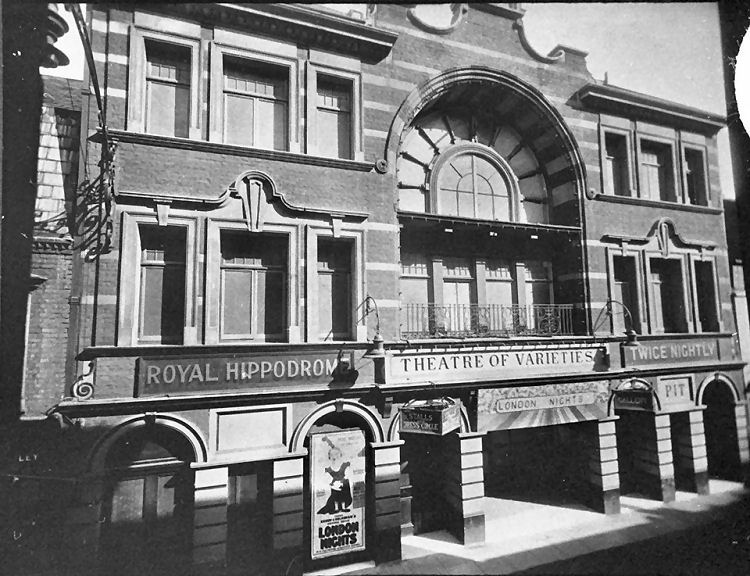
Apart from the way the character of the old town or
Dover was changed by the devastation wrought by bombing and shelling
during the last war, one or the most lamented losses was that of the old
Royal Hippodrome theatre. This popular entertainment spot - the spacious
building extended from Snargate Street through to Northampton Street -
was so badly damaged by enemy action that it had to be demolished after
the war. |
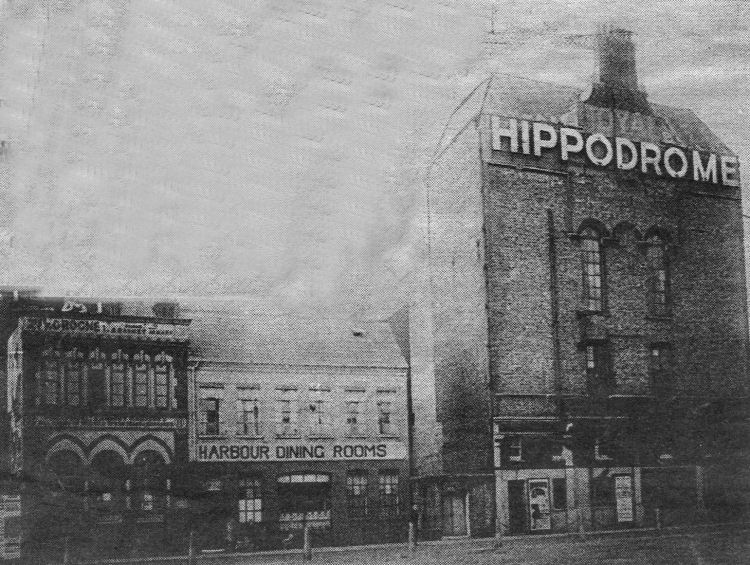 |
|
Victim of war
DOMINANT feature or Northampton Street and Snargate Street for many
years was the Hippodrome theatre which underwent a number or name
changes and, sadly, was destroyed almost by the last shell fired by the
enemy's long range guns during the Second World War.
The late
proprietor, Herbert Armstrong, bravely kept the theatre going right
up until the fateful shell hit the building during a morning rehearsal
in September 18, 1944. The unusual building on the left was occupied by
W. Grognet, who made and repaired all kinds of theatrical, business
and domestic wicker-work baskets and other goods.
The Hippodrome's shell was demolished in 1951. See below Express 19
January 1951.
|
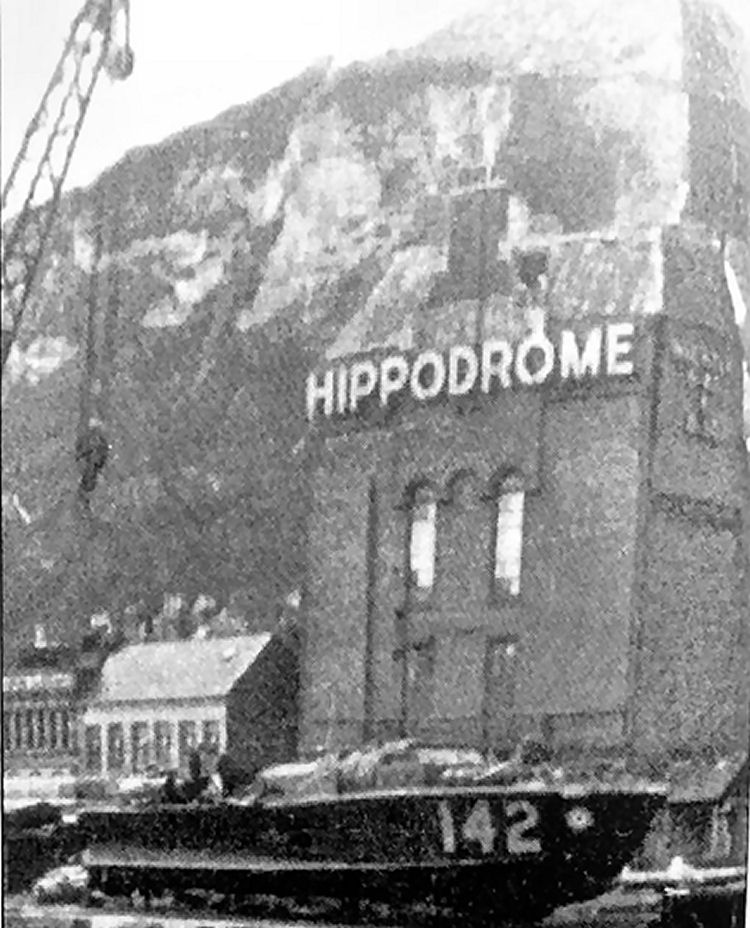
Above photo showing HSL 142 up on the hard, being repaired in
Wellington Dock after being shot up by an enemy aircraft at 16.00 hours
on 3rd March 1941 when returning to base at Dover. After repair she was
shipped ont to Gibraltar ASR base. |
Built originally as "The Theatre Royal" in 1790 but at that time opening
in the winter only. As the "Dover Theatre" or "Clarence Saloon" it was
bought by Browning in 1858 who then featured concerts and ballets in the
evenings. The name changed to "Gaiety Theatre" in 1875 and was bought by the
brewers Kingsford and Company that year.
Known as the "Dover Theatre" when it was rebuilt in 1896 but as the
"Dover Tivoli Theatre" when it reopened on 14 June 1897. The manager was
Amand Mascard. The "Princess Alice" which had stood next door was swallowed
by the new edifice, which did incorporate a bar of course, where the
entertainers could be met during the interval. The former bar had been the
"Clarence Tavern" and later, the "Hippodrome Bars" became just as popular.
|
From the Dover Express and East Kent News, Friday, 7
March, 1902. Price 1d.
THE CHILDREN'S SPECTACLE
Mr. S. Payn applied, on behalf of Mr. T. G. Transfield, for a licence
to employ 56 children at the "Hippodrome" in a spectacular scene. The
magistrates declined to grant the request. Opposition was offered by the
Town Clerk, representing the School Attendance Committee.
|
By 1903, it was the "Theatre Royal," once more, but closed for extensive
alterations in 1906. It next reappeared as the "Royal Hippodrome" reopening
in March 1910. "The Palace and Hippodrome Southern" made its appearance in
the Market Square the same year.
|
From the Dover Express and East Kent News, Friday, 24 April, 1914. Price 1d.
THE ROYAL HIPPODROME
Mr. J. T. Poole, the popular manager of the “Royal Hippodrome,” has this
week another excellent variety programme for the patrons of the
“Hippodrome,” the chief item on which Miss Mary Mayfrens Co., in “The
Yellow Fang,” a dramatic and exciting episode of an opium den in
Chinatown, San Francisco. It is full of dramatic and exciting scenes,
and the different characters are well sustained by Mr. George Pickett,
Mr. Laurence Osbourne, Mr. Alfred Fisher, Mr. A. Gordon Laws, Mr. Walter
Finney and Miss Violet Campbell. The Two Sordinis give a splendid
musical turn, and are loudly applauded. Capt. Spaulding, the wizard of
fire, gives some marvellous exhibitions of fire eating. He bites ends
off electrically heated carbons, pours molten lead into his mouth, and
does several other things which would be fatal to the ordinary person.
He also walks amongst the audience allowing people to put their cigars
out on his tongue. Billy Marsden gives some delightful concertina tunes,
and is very amusing with his patter. Miss Le Compt an American comedian,
is very popular, as also is Miss may Poulton, another comedienne, whilst
Billy Marsden is very funny, and causes roars of laughter in his latest
successes.
|
|
From the Dover Express and East Kent News, Friday, 2 February, 1917.
RAPID EFFECT OF GIN
At the Dover Police Court on Saturday before Messrs. W. J. Barnes J. W.
Bussey, and H. Hobday.
Selina Levy, of 19, Ladywell Place, was summoned for being drunk and
incapable in Cannon Street.
Police-sergeant Popple said: At 10.30 p.m. on Saturday night I saw
defendant helplessly drunk in Cannon Street, and had to convey her to
the Police Station on an ambulance.
Defendant said that she was sober at 10 p.m., but she went to the
“Hippodrome” and saw a friend of hers and she had a glass of gin which
overcame her. She could not remember being conveyed to the Police
Station.
A fine of 2s. 6d. was inflicted.
|
|
Dover Express 26th April 1918.
ROW AT THE HIPPODROME.
At the Dover Police Court on Tuesday before Messrs.. Edward Chitty (in
the chair) and H. Hobday.
James Kinsella, a bluejacket, with having been drunk and disorderly and
with refusing to quit licensed premises at “The Royal Hippodrome” and,
further, with assaulting Police Sergt. Husk.
Police Sergt. Husk said that, at 9.30 p.m. he was on duty at the Royal
Hippodrome and saw a disturbance near the emergency exit door of the
“pit”. He found an attendant named Terry and P.C. Harman tried to get the
prisoner and another sailor, who were drunk, to leave the premises. The
prisoner said that he was Irish and not going to be put out, and became
very rough and struck witness in the face. The other man was very
violent and the P.C. took him away.
W. C. Terry, an attendant at the Hippodrome, said that the man became a
nuisance in the pit and witness had to restrain him. At the pit door the
prisoner struck the Sergeant and also P.C. Harman.
The Chief Constable said that the prisoner was absolutely mad when he
came into the Police Station.
Fined 20s for drunkenness and 20s for the assault.
|
In Snargate Street, the proprietors by 1936 were North Britain Theatres
Limited.
The theatre, including three bars and 35 Snargate Street had been sold on
22 July 1931 when the lease was £160 per annum.
|
From the Dover Express and East Kent News, Friday, 12 February, 1932. Price 1½d.
THE HIPPODROME AS A THEATRE – LATEST PROPOSAL
It will be noted from our advertising columns that an effort is being
made to form a local private limited liability company, with a nominal
capital of £1,500, to acquire the remaining fourteen years' lease and
run the property as a theatre. The promoter, Mr. F. L. Loveridge (who
has resided in the Borough for some 30 years) thinks that Dover can and
will rise to the occasion. He believes that if local capital and
management were vested in the “Hippodrome,” interest would be around and
people would rally round to make the place self supporting and enable it
to show a reasonable return on the capital invested. It must be
remembered that it means the employment of actors, actresses, musicians,
and the usual personnel connected with the running of the theatre, who
must, of necessity, spend their wages in the town.
|
|
From the Dover Express and East Kent News, Friday, 14 October, 1932. Price 1½d.
HIPPODROME PARTY'S FATAL CRASH
A very sad accident happened on the Cheriton Road, Folkestone, soon
after midnight on Saturday, when Miss Alma Peters, of Folkestone, who
was accompanied by Lance-Corporal Carter, of the 2nd Battalion The
Buffs, was knocked down by a motor-cycle, driven by John Arthur Crothall,
of 29, Trimworth Road, Folkestone. A sequel to this was the finding of
Lance-Corpl. Carter's body on the railway line at the Warren on Tuesday
night, with the head severed.
The inquest on Miss Peters, conducted by Mr. G. W. Haines (Folkestone
Borough Coroner) was held at the Town Hall, Folkestone, yesterday,
(Thursday) afternoon. Mr. Medlicott, of Folkestone, appeared for Mr.
Crothall.
The Coroner said that, unfortunately, the soldier would be unable to
give evidence as his dead body had been found at the Warren, and Andrew
Purdey, the pillion rider, also would be unable to give evidence as he
was still ill in hospital, and was unable to remember anything about the
accident.
Dr. I. E. Brookes, the Resident House Surgeon at the Royal Victoria
Hospital, Folkestone, said that death was due to a fractured skull and
shock.
P.C. Farrier said that the road was very dark at the scene of the
accident, which was opposite Martin Walter's motor works, on the
Cheriton Road. The night was rough, and the roads wet. In a statement,
Crothall said that he estimated his speed at 35 m.p.h. He was unable to
see which way they were going so he pulled out to the middle of the
road.
Mr. R. D. Walker, 328, Cheriton Road, Folkestone, said that he had a
party of friends, which included Crothall and Purdey, went to the
Hippodrome at Dover. He was driving a car, and Mr. Mazetti was driving a
car, and Crothall, with Purdey as pillion passenger, was driving a
motor-cycle. They arrived at Folkestone at about 11.45 p.m., and then
went on to Cheriton and Newington. On their return they stopped at
Trimworth Road to discharge some passengers, but Crothall went on.
Mazetti and he followed later, and when they were near Martin Walter's
they saw Crothall in the road signalling them to stop. The girl was
lying in the middle of the road, and Purdey was lying in the gutter.
Carter was supporting the girl.
In reply to the Coroner, witness said that none of the party had a drink
all the evening.
The Coroner read a statement made by Lance-Corporal Carter to the
Police, directly after the accident, in which he said that he was
engaged to the deceased, and was returning from a dance at Cheriton.
They were walking in the roadway to escape the rain-drops from the
trees. He heard the sound of a motor-cycle coming behind, and he turned
round and saw it was about 200 yards away. They gradually edged towards
the curb, and he glanced round again and saw it was nearly on top of
him, and before he could get out of the way it ran into them. Miss
Peters was walking nearer to the curb.
Mr. Crothall, who is 20 years of age, said that he was a builder
student. He was riding an Ariel 2¼-h.p. motor-cycle. As was his habit in
the town he was only using his dim-lights, which only illuminated the
road up to 12ft. in front of him. When he was opposite Martin Walter's,
he saw two figures in front of him; he shut off his engine, and then
there was a crash. Carter was running about the road and saying, “Where
is she?”
In reply to the Coroner, he said that he was travelling at 30 miles per
hour. He could pull up ion 30 yards on a wet road. He did not know
whether he applied his brakes or not.
The Coroner, in his summing up, said that in the case of a driver who
drove along a road at 30 m.p.h. and knew he could not pull up under 30
yards, it was not safe for such a person top hold a licence, for he held
their lives in their hands.
The Jury returned a verdict that death was due to being run over by the
motor-cycle, which was being negligently driven by Mr. Crothall. The
negligence did not amount to manslaughter.
THE TRAGIC SEQUEL
The body of Lance-Corporal Carter was, on Tuesday night at 11.05 p.m.,
found in the 6ft way of the Southern Railway, near the Warren Station.
His head was severed from the body. Lance-Corporal Carter was engaged to
the dead girl, was very heart broken at her death. The body was removed
to the “Valiant Sailor,” where Mr. R. Mowll, the East Kent Coroner, will
hold an inquest to-day.
|
|
From the Dover Express and East Kent News, Friday, 14 October, 1932. Price 1½d.
SUNDAY CONCERT AT THE HIPPODROME
At the Special Transfer Sessions, held at the Dover Police Court on
Friday, before Messrs. W. J. Barnes, J. W. Bussey, W. Bradley, S. J.
Livings, W. S. Lee, W. B. Brett and W. L. Law.
Mr. W. Rice applied on behalf of the “Royal Hippodrome” for a licence
for music and singing on Sundays, during the winter months, as he had
had several applications from local bands, etc., to give concerts there.
The programmes would be thoroughly discreet, and he was prepared to give
a certain amount to charity, as might be decreed, including the Mayor's
Fund and the Hospital. He produced letters from Betteshanger Colliery
Welfare Silver Band, and the Deal and District Cymric Male Voice Choir
of 33 voices.
The Chairman said they did not want comic songs, but there was no
objection to nice singing.
The allocation was granted, the hours being from 6 till 10 p.m., and
provided that the bars were closed.
|
|
From the Dover Express and East Kent News, Friday, 10 March, 1933. Price 1½d.
HOW THE HIPPODROME HELPS EMPLOYMENT
(To the Editor of the Dover Express.)
Sir, - The recent production of “The Belle of New York” at the “Royal
Hippodrome” gave the writer, as one of the performers, a first-hand
opportunity of viewing the organisation and staff necessary to conduct
the theatre. Our week was a particularly happy one, and, viewed from all
angles, perhaps the outstanding characteristic was the cleanliness and
comfort of the theatre, allied for the whole-hearted support of the
proprietor and his very energetic staff. It can now be mentioned that
the dress rehearsal had to be abandoned on Monday afternoon owing to
alteration of scenery, and it says much for the loyalty of the staff
when I state that they worked solidly for twelve hours, without a break
for food, to ensure that the stage would be ready for the first night's
performances. I was surprised to find, and I am sure your readers will
be surprised to read, that the “Hippodrome” provides employment for
approximately thirty persons. This presents the permanent local
employees, to which must be added the articles providing the weekly
programme, making a total employment of about 45 persons. The total
wages or salaries list artists work out at anything up to £250 per week,
the bulk of which circulates in Dover. With these facts before us, it
must be admitted that the “Hippodrome” is a decided asset to the town,
yet on a recent visit I was distressed to find that the attendance was
painfully small. Why is it? The theatre is cosy and warm; the staff
always cheerful, and the programmes quite good. I saw among last week's
performance two turns who could hold their own at the London Palladium,
yet with such material on show the house could not be considered good. I
received a circular a short time ago with some very sound Rotarian
suggestions for reducing employment, emphasising the importance of
spending just that little bit extra on the house, clothes, business
premises, etc., all with one object in view – the retention of men in
their present employment. I whole-heartedly agree with the idea, and as
it is generally agreed that entertainment forms part of our national
life, I want to appeal to the townspeople of Dover that they make a
strong effort to spend at least, a part of their amusement money in
support of the Hippodrome, thus ensuing that the many employees retain
their employment. Now, Dover, what about it? Please believe that I have
no personal interest in this matter, neither am I a publicity booster
for the proprietor.
Snifkins.
|
|
From the Dover Express and East Kent News. Friday 24 June, 1938.
NO TRUTH IN HIPPODROME CLOSURE RUMOURS
There has been a rumour in Dover recently that the Royal Hippodrome
is to close at an early date owing to the proposed Snargate Street
improvement, but this is quite untrue. In answers to enquiries, Mr.
Armstrong, Managing Director of the Hippodrome, says that he has not yet
even been approached as to terminating his lease, which has several
years to run. Naturally, rumours of an early closure are very damaging
to the Hippodrome from a business point of view. Future bookings have
been made, in fact, as far ahead as the Christmas pantomime, which will
be "Cinderella," starting on Boxing Day. Coming closer to the present
moment, next weeks Chapmans' Royal Bengal Circus will be at the
Hippodrome; the following week will see "The Ovaltinies"; and a week
later Dorothy Holbrook's "Hussar Band." A very good booking has been
made for the week beginning July 27th, when Nellie Wallace is to come to
the Hippodrome. These few samples of the attractions to come are one of
the best refutations of the rumour as to closing. The Hippodrome has
improved under Mr. Armstrong's management during the last two years in a
degree not generally realised. There was a time when people went out of
Dover for theatrical shows. To-day conditions are reversed, and visitors
from Folkestone and Deal form part of the regular clientéle
of the Hippodrome.
|
|
From the Dover Express and East Kent News, 12 August, 1938. Price 1½d.
THE HIPPODROME
Hughie Green's latest production “Stars of To-morrow,” comes to the
“Hippodrome” next week. His latest discoveries to be seen will be George
Formby's young sister, Ethel, with her uke' and songs; also Joey
Hopkinson, the boy comedian from the new film “Melodyand Romance” and
Britain's young Joe E. Brown. |
|
From the Dover Express and East Kent News, 7 October, 1938. Price 1½d.
A HIPPODROME ANNIVERSARY
The “Hippodrome” next week is celebrating the second anniversary of its
re-opening of the Theatre under Mr. Armstrong's proprietorship, and he
is to be heartily congratulated on the perseverance he has shown in
making the Theatre what it is today. In October, 1936, he arrived in
Dover and shared in a partnership which, however, was dissolved in the
following march, since when Mrs. Armstrong and he have had joint
control. Thanks to Mr. Armstrong's determination to improve the standard
of entertainment provided and raise the tome of the Theatre, it is
to-day considered to be one of the best in the provinces. The condition
and position of Snargate Street has by no means helped in this
resuscitation, though even that has not prevented the Theatre from
becoming widely patronised. There are many who have never been inside
the Theatre owing to its position, but those who have, have been amply
rewarded and a very large number have become weekly patrons. In addition
to drawing on Dover it is noteworthy that large numbers visit the
Theatre from Folkestone, Deal, Canterbury and the surrounding districts.
As will be seen from the advertisement, there is an attractive programme
for next week, and in addition special gifts will be presented to
members of the audience throughout the week.
|
|
From the Dover Express and East Kent News. 13 January 1939.
The last of three pantomimes will be staged next week, when Frank Roy
presents the popular pantomime, "Dick Wittington and his Cat." "Idle
Jack" will be played by the young Yorkshire commedian, Leslie Gunby, and
the "cook" by Al. Almont; "Alice Fitzwarren" by Shirley Winter, and "Fitzwarren"
by Roy Raymond. The principal boy, Margaret Marsh, is an excellent
"Dick Wittington," and Maurice Sanger, the "cat." Matinees will be held
on Wednesday and Saturday, with special prices for children.
|
|
From the Dover Express and East Kent News. 20 November 1942.
POPPY DAY, DOVER'S FINE EFFORT
It was reported that the "Hippodrome" raised the sum of £8 8s. 2d.
for the Poppy Fund of 1942.
|
The theatre carried on, 'Windmill' fashion, during world war two but was
forced to close in September 1944 and on the 25th of that month a shell from
France took off the roof and part of one side. Tremendous efforts were made
post war to effect repairs and reopen. "The Hippodrome Bars" dispensing
meanwhile from amongst the rubble. Compulsory purchase was the order of the
day however and the closure there came in August 1950.
|
|
|
Dover Express 28th June 1946.
THREE MEN FOR TRIAL. HIPPODROME BURGLARY.
At Dover on Friday before Mr. W. J. Pudney, presiding.
James Joseph Dillon, aged 25, of Seven Star Street Flats, a labourer,
Edward Alexander Clithero, 20, of Snargate Street, a miner, and Roy
Harkett, 19, of Caroline Place, a miner, were charged with, on June 8th,
breaking and entering the Royal Hippodrome bar and stealing a wireless
set, wine, rum, whisky, gin, cigars and cigarettes, valued at £31 5s 6d.
PC Bowers said that, at 1.30 a.m. on June 9th, he was called to a
disturbance at 7, Caroline Place, where he found Clithero lying on the
kitchen floor drunk. Dillon was also there and had been drinking.
Witness saw four bottles, whisky, gin, rum and wine. Dillon said “I have
had a good evening and its cost me £12 for this stuff and the beer.
We’ve been celebrating. It’s my sister’s birthday.”
DC Wright said in response to a telephone message to the police from
Mrs. Edith Catherine Scott, manageress of the Hippodrome bars, reporting
the burglary, he went to the Hippodrome at 7.20 p.m. on June 9th and,
examining the premises, found access had been gained by means of a
window on the first floor at the rear of the building in Northampton
Street. At 8.20 the same evening, he went to 142 Snargate Street where
he saw Dillon and Clithero. He searched the premises and found bottles
of whisky and port, whereupon Clithero handed him a packet of
cigarettes, saying “Jimmy gave them to me last night” referring to the
cigarettes, whisky and port. Witness said that he would take defendants
to the Police Station, but, outside the building, Dillon broke away.
When he was eventually caught in the gardens at the rear of Cambridge
Terrace, he said “Give me a razor and I’ll finish myself off”. After
Dillon had been taken to the police station, witness returned to 142
Snargate Street for Clithero, who said “I’ll show you where we put the
wireless set” and took witness to a bombed house where the set was
concealed. Returning again to the house in Snargate Street, witness saw
Harkett, who admitted having cigars, gin and wine in the house. He too
was taken to the police station where he made a statement in which he
said that, on the Saturday night at about 11 o’clock, he went with the
other two defendants to the back of the Hippodrome. He bunked Jimmy
(meaning Dillon) up to the window and the stuff was thrown down to him.
Clithero also made a statement in which he admitted keeping a watch
while Dillon was obtaining entry. Dillon stated that, after they had
taken the stuff, they went to Harkett’s house for a drink. Harkett
“passed out” at about 12.30 and Clithero at about 12.45. He stayed awake
all night and, the following day, went fishing, when he threw some of
the stuff over the side.
Defendants were committed for trial at the Dover Quarter Sessions on
July 15th, Dillon in custody and Clithero and Harkett on bail.
The man named Dillon with 7 previous convictions although he pleaded
that he had some kind of mental illness, he got 6 months in July 1946.
In May 1947 he was back in court with a soldier charged with breaking
into Burtons. They were sent for trial.
|
|
Dover Express 19th July 1946.
Dover Quarter Sessions.
The Hippodrome Burglary.
James Joseph Dillon, aged 23, of Seven Star Street Flats, cabinet maker,
Roy Harkett, 18, miner, of 7 Caroline Place, and Edmund Alexander
Clithero, aged 21, miner, of 142 Snargate Street, pleaded guilty to
breaking and entering the "Royal Hippodrome" on Tuesday June 8th and
stealing a five valve wireless set, bottles of port wine, whisky and
other articles value £31. 5s 6d the property of Mr. H. R. Armstrong.
Mr. Maxwell J. H. Turner appeared for the prosecution and Mr. Wilson Price
for Dillon.
Mr. Turner said that, on the night of June 8th somebody broke into the
premises of the Hippodrome by tearing away the first-aid repair covering
of a window and thus gaining access to the bar. About 1.30 the following
morning, PC Bowers was called to a disturbance at 7 Caroline Place,
where he found Clithero lying on the floor, drunk, and Dillon, who had
also been drinking. There were bottles of gin, rum and whisky about and
Dillon said “I have had a good evening. This lot cost me £12. The
following afternoon it was found that the Hippodrome had been broken
into and this property was missing. Later, the Police saw Dillon and
Clithero at 142 Snargate Street. Dillon was arrested and, on the way to
the Police Station, he ran away, but was recaptured after a chase. He
then said “Give me a razor and I’ll finish myself off”. Clithero was
also arrested and, on the way to the Police Station, he said “I’ll show
you where we put the wireless set” and took them to a war-damaged house,
where the set was found. When the third defendant was seen, he produced
some cigars and a bottle of gin, part of the proceeds of the burglary.
Altogether £21. 14s 1d worth of stolen property had been recovered. In
their statements the accused all said the same ---- that Dillon went in
through the window while the others waited outside. Clithero said he was
keeping watch. Mr. Turner mentioned that Harkett, after being committed
for trial on this charge, was arrested in London and sentenced to 14
days hard labour for being a suspected person loitering with intent
commit a felony.
DC Wright stated that Dillon had seven previous convictions, mostly for
larceny and looting, the last being 3 years Borstal treatment for two
cases of looting. He served two years in the army and was discharged on
medical grounds. He was released from Borstal in February this year and
had followed no employment since. He had tried to get employment on a
sea-going vessel. Harkett had two previous convictions, including the
one mentioned by Mr. Turner. He was a married man with one child and had
been employed at Snowdown Colliery since leaving school. He was a
brother-in-law of Dillon. Clithero was also married and had one child.
He was directed into the mining industry in 1941 and was released in May
on medical grounds, being at present unemployed.
Mr. Hartley Horsfield, the Probation Officer, stated that, as long as Harkett
worked on the shift with his father, he did well, but, since his
marriage, he had not been working regularly and his record had
deteriorated. With regard to the offence in London, Harkett stated that
he hitch-hiked to London and had not been there many hours and was
looking for somewhere to sleep when he was arrested. They said he had
been trying a door. Clithero was the most intelligent of the three men.
It seemed that the collieries had undermined his health. He had been
having rather a difficult time because of ill health.
Mr. Wilson Price submitted that there was some grounds for the view that
Dillon’s behaviour in this case and his past record was partly the
result of some mental state from which he was suffering. He was
discharged from the Army after having been seen by a psychiatrist
spending some months in a mental hospital. He was not granted a pension
and that rather made him feel that he was being treated unfairly and did
not tend to help his position. Having regard to all the circumstances
and to the fact that this escapade took place on the night of the
Victory celebrations, this was a case which might be dealt with as
somewhat out of the ordinary and perhaps treat Dillon rather more
leniently than his previous record might normally allow.
Clithero stated that he committed the offence because he was very hard
up and the doctor at the clinic had told his wife it would be best for
the health of their child if it was taken away from Dover for a few
weeks for a change of air.
Mrs. Clithero, called by her husband, gave similar evidence.
The Deputy Recorder said she was taking into account the fact that this
was Victory night and also bearing in mind that it was an isolated
offence and not one of a series. But, in the case of Dillon, there was
the very serious feature which she could not overlook ---- that he had
only been released from Borstal on February 27th. In the circumstances,
he would have to go to prison for six months. She had been seriously
considering whether she ought not to send Harkett to a Borstal
Institution, but had decided to bind him over for two years. Clithero,
too, would be given a chance to live this down and would be placed on
probation under Mr. Horsfield for two years.
|
|
Dover Express 16th May 1947.
We regret to record the death, which took place suddenly at Dundee on
Wednesday, of Mr. H. R. Armstrong who for many years was manager of the
"Royal Hippodrome." Throughout the war, he kept this place of
entertainment open and received national publicity because of it. It was
a stroke of misfortune that, in the last weeks of shelling, the building
was hit. It has been closed since. For some time afterwards, Mr.
Armstrong managed the Pleasure Gardens Theatre, Folkestone.
|
|
Dover Express 30th May 1947.
THE LATE MR. H. R. ARMSTRONG.
The interment of the ashes of Mr. Herbert Roberts Armstrong, whose
death occurred at Dundee on May 14th after only a short illness, took
place at St. Mary’s Cemetery on Thursday last week. Mr. Armstrong who,
only three weeks before his death, had taken over the managership of the
"Palace Theatre," Dundee, will be especially remembered by many who
remained in Dover throughout the war years for his untiring efforts to
provide variety shows at the "Royal Hippodrome," which he managed with
great success for twelve years. It was not until the last week of enemy
shelling, when the Hippodrome received a direct hit from a shell, that
the building was finally closed.
One who had known Mr. Armstrong for many years, writes of him: On
Thursday 22nd May, at St. Mary’s Cemetery, Dover, we said farewell to
Herbert Roberts Armstrong, late proprietor of the "Royal Hippodrome
Theatre." He passed away as he would have wished – in harness – for he
had become the manager of the "Palace Theatre," Dundee. A chill caused an
attack of bronchial pneumonia which proved fatal. His valiant efforts to
keep the "Hippodrome Theatre" providing entertainment during the war years
will not be forgotten. In all walks of life, many people have lost a
friend.
|
|
Dover Express 20th June 1947.
Town, Port & Garrison.
An application for the transfer of the licence of the "Royal Hippodrome"
from Herbert Roberts Armstrong deceased to Mrs. Annie Rosina Armstrong
of 103 Maison Dieu Road, was granted by the Dover Magistrates on Friday.
|
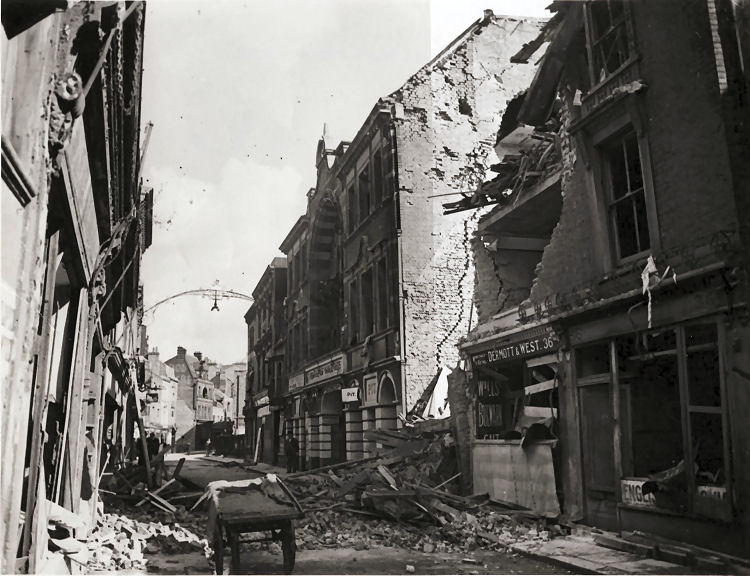
The Royal Hippodrome showing the war damage. By kind
permission of Dover Library. |
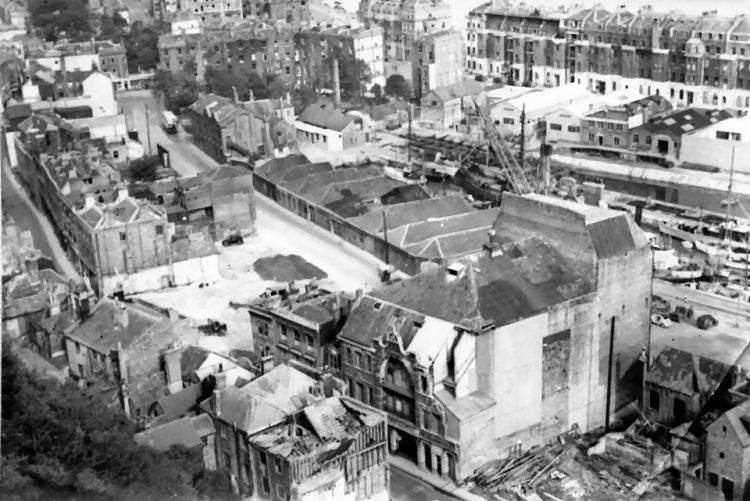
Above photo after 1947. Kindly sent by Paul Wells. |
Perhaps Fremlin at the finish but for many years an out let of George
Beer and Rigden. Sad to say, in 1990, nothing to compare - if ever that was
possible has materialised.
|
From the Dover Express and East Kent News, Friday, 13
October, 1950.
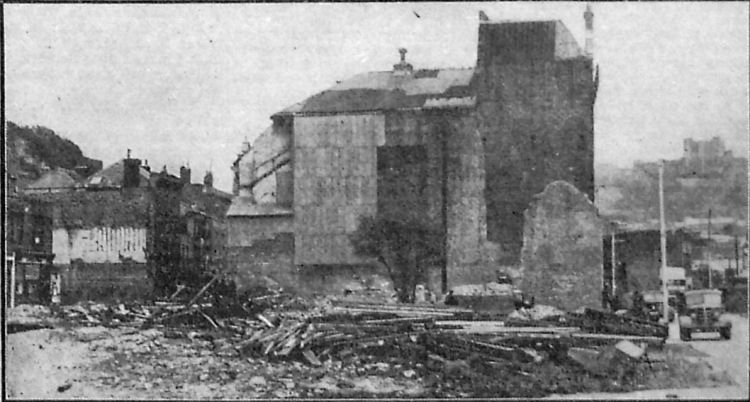
TRANSFORMING SNARGATE STREET
Demolition work is practically completed of the
property on the seaward side of Snargate Street from the old bethel
Corner as far as the Hippodrome. The contract for he Hippodrome's
removal has been let, and work is expected to begin shortly.
|
|
From the Dover Express, 19 January 1951.
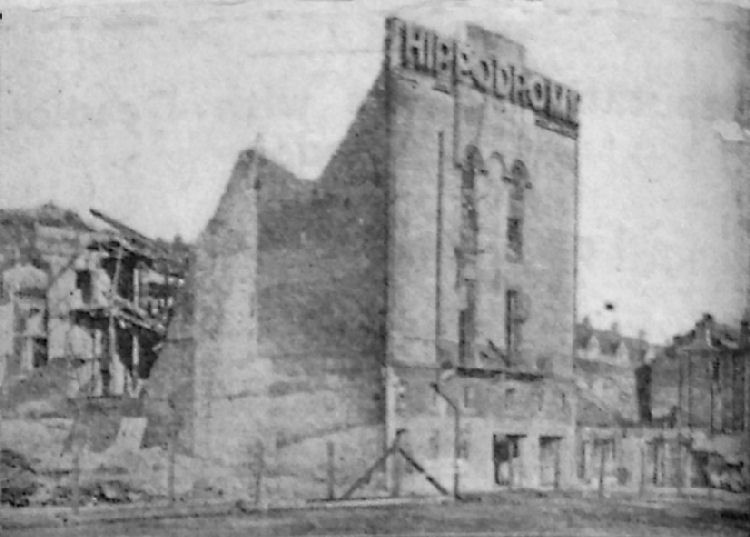
"BRINGING DOWN THE HOUSE"
FOR THE LAST TIME.
As workmen were pulling down the main wall of the Hippodrome by means of
the wire hawsers attached to a winch, tons of masonry and brickwork,
which should have fallen inside the remains of the building, collapsed
across Northampton Street early on Monday afternoon.
The first picture, taken only just over an hour before, shows the wall
before its collapse. The wires can be seen coming from the windows and
going over the top of the wall. In the second picture workmen clear away
the rubble, while lorries and cars detour along part of the quayside.
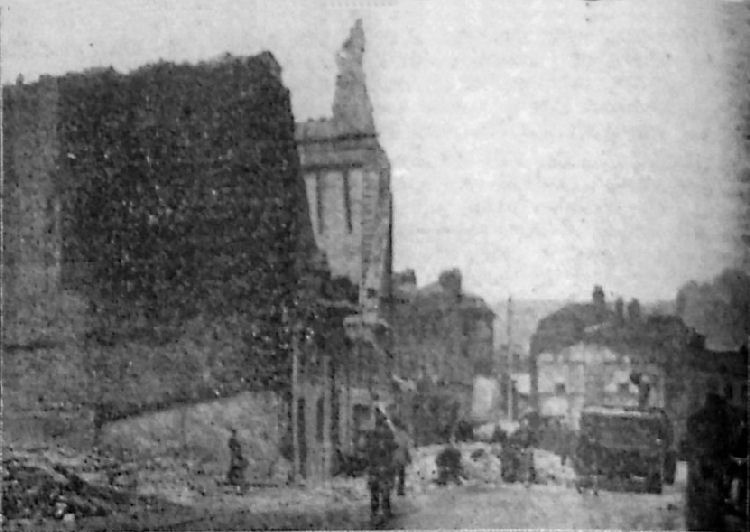
|
|
From the Dover Express, 13 April 1951
Another Hippodrome Memory
Mrs. Vallat, of 118, Framfield Road, Hanwell, W.7., in a Ietter to the
Editor, writes:-
"I see our old friend, the 'Express,' has raised it's price; but, anyway,
it's worth it. There is more news in it than in any London newspaper. I
always look it right through, and know the devastation through bombing
and demolition. One thing I noticed Particularly was the taking down of
the old Clarence Theatre, as it was called when I was young.
"It was on that stage that I first appeared, as one of the 92nd
Highlander's who relieved Cawnpore in the Indian Mutiny. There were
about 50 little girls dressed in kilts-with guns and all -and we marched
over a high bridge, back-stage, to the tune of 'Blue Bonnets over the
Border' and 'The Campbell's are Coming.' Then we went in to kill the
sepoys-all the bangs made back-stage-and we carried off the dead bodies
(all blacks) and came in again as reinforcements.
"Ah, those were the days. How we all enjoyed two performances nightly.
How sorry I was when it was all over. I think we were paid three or tour
shillings a week. I can't think how I was then. I wonder if anyone I
else remembers those days and the plays-'Uncle Tom's Cabin' and all the
sensational dramas, and the Scotch and Irish comedians.
"I loved the stage, and when they were engaging girls for the pantomime,
I used to go every day to see if there was a vacancy. How disappointed I was, as I wasn't a
dancer then.
|
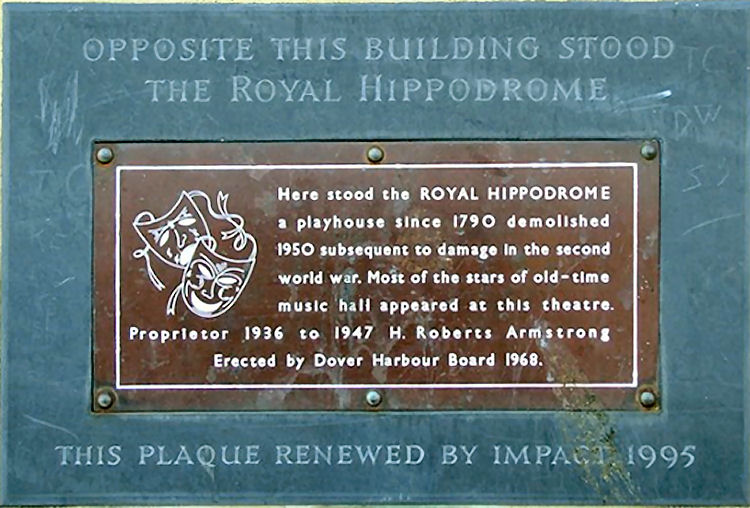
Above plaque showing the Hippodrome position. |
LICENSEE LIST
BROWNING Benjamin 1858-72 (age 60 in 1871 ) )
WARE George 1877 (Gaiety)
HOLFORD E W 1909-10
POOLE J T or T J 1914-16 end
HOWARD S P 1918
TINDELL H 1923
McDONALD William 1923-Feb/29

 (Manager) (Manager)
RAYMOND H G Dec/1926-33 and

WINTER Mrs Florence A Dec/1926-28 dec'd

PEACHEY George Wyatt 1928-33
DUNBAR A D 1929
ALLEN R 1930
RAYMOND & PEACHY Messrs to Sept/1932

RICE Wally Sept/1932+

ARMSTRONG H Roberts 1933 and 1936-45
POWELL H 1934
LOVERIDGE Thomas (Fred) Langdon 1934-Jan/36

MARTIN Wilfred (Sec. Messrs. George beer & Rigden) Jan-Dec/1936

ARMSTRONG H Roberts (Manager North Britain Theatres Ltd.) Dec/1936-June/47
dec'd

ARMSTRONG Mrs Annie Rosina June/1947-Aug/48

PHILLIPS Hebden 1948
RUFF Ernest Frederick Aug/1948 (Secretary of Messrs. George Beer and
Rigden, the management to be placed in the hands of Mr. and Mrs. Francis)

 FRANCIS Horace Aug/1948-50
FRANCIS Horace Aug/1948-50

|
From an email received 4 April 2010.
I am unsure if the bits of information I am sending are of any
significance, but having found this website, I am keen to share the few
family stories I have which relate to the pubs mentioned in and around
the Dover area.
My knowledge of the Hippodrome relates to Mr and Mrs Armstrong, both of
whom it appears ran the Hippodrome at some time during the the years
leading up to and after the Second World War. Although my Dover family
were evacuated to Wales during the war and didn't ever return to Dover
to live, my parents used to take my brother and I down to Dover from
Birmingham to visit remaining family members there in the 1950s and 60s.
One of my great uncles lived in the basement at 9 Cambridge Terrace
(most recently offices for the Dover Harbour Board). His friend used to
be a cobbler and could be seen in the window (looking down over the
railings) mending shoes...we used to be fascinated watching him with a
mouthful of tacks which he spat out accurately as he nailed down the
soles of the shoes he was repairing. The rear of the property stands
behind the gates alongside the car park leading to De Bradlei
Wharf.....but I digress!
Mrs Armstrong, who by then was widowed, was their landlady at 9
Cambridge Terrace in the 1950s and although to me as a youngster in
those days she was a person who was spoken about but never seen, in
later years, as a result of circumstances, my husband and I got to meet
this once, very grand, old lady. By the early 1970s she was living in a
room (possibly rooms) in one of the old Hotels in Folkestone with all
her possessions in a few battered old trunks. One day we were taken to
visit her. She was a wonderful old lady, probably in her 90s, full of
tales of a very exciting, rich and varied life. I only wish I had
listened more attentively. It seems that her husband had worked for BP
Oil in it's early days and as a result he travelled quite extensively.
It seems that she too, on occasions, travelled with him and she proudly
told us of her exploits to the Middle East. She was apparently the first
white woman to travel to Persia in 1921. She relayed tales of living in
a tented camp, where she was escorted everywhere. There were just a few
yards of asphalted track-ways around the camp and she was not allowed to
go anywhere at all after dark. Somewhere or other, in I think it was in
an early Sunday Times magazine, there is a photograph of Mrs Armstrong
with T E Lawrence - Lawrence of Arabia - when she was out in Persia. She
told of the occasions when she met him. Amongst her possessions in her
few old battered trunks were the most incredible collections of things
she had bought back from her travels - given that they may have been
living in the Hippodrome when it was bombed, it was amazing that they
survived. The one thing that stands out in my memory was a pair of the
most delicate tall slender vessels in a fine blue glass. She said they
had come from the Wailing Wall and were called Tear Vases. It was
apparently into these that the Wailing Women of Babylon collected their
tears.
We heard that when she died a couple of years afterwards in her mid to
late 90s. Her possessions were taken to London to be auctioned at one of
the big Auction Houses. When these vases, which were expected to get a
high price because they were a pair, were being unwrapped for display,
one of them was dropped and smashed beyond recognition! Thank goodness I
didn't drop them when I was allowed to hold and study them!
The link with her continued with through a rather strange connection
we had as a family to the older 'Gay' community in Dover in the 1960s
and 70s.... my great uncle - a lovely kind gentle man, lived with his
gentleman companion (the cobbler) in Cambridge Terrace. My grandmother
received a letter from him in the mid 1960s asking her to go down to
Dover to help his friend nurse him, as he was dying of cancer. She
naturally ran to her brother's side and attended to him in his final
weeks. After that 'the Boys' as she always called his group of close
friends, rallied round in gratitude and she almost became one of their
own. As she was widowed and living alone she got taken on holidays with
them and spent weeks on end staying in Dover and visiting their friends
and haunts (the "White Horse" at the
bottom of Castle Hill being their local as they lived in Victoria Park).
Mrs. Armstrong was often spoken of and seemed to be part and parcel of
this group (several of whom had interests in antiques and objects of
interest!) When my husband and I got married we too were welcomed down
to stay with them in Victoria Park, on a couple of occasions taking my
nan with us. It was during one of these visits that we finally met Mrs.
Armstrong. You can read what you like into all of this, but a nicer,
kinder group of people you couldn't have wished to meet... my husband
and I were alarmed to say the least to discover the living arrangements
(young, naive couple that we were!) and my nan, bless her, to her dying
day did not know that they were all 'Nancy Boys' as she'd have called
them!
So, how or why she and her husband would have come from such an exotic
life to returning to Dover to run the Hippodrome, seems to be quite a
change of circumstances and fortune. As far as I know, they had no
children, but I believe their were a couple of nieces who may well have
benefited from the sale of her wonderful treasures in the 1970s.
Margaret Francis.
|
 From Pikes Dover Blue Book 1948-49 From Pikes Dover Blue Book 1948-49
 From the Dover Express From the Dover Express
|









